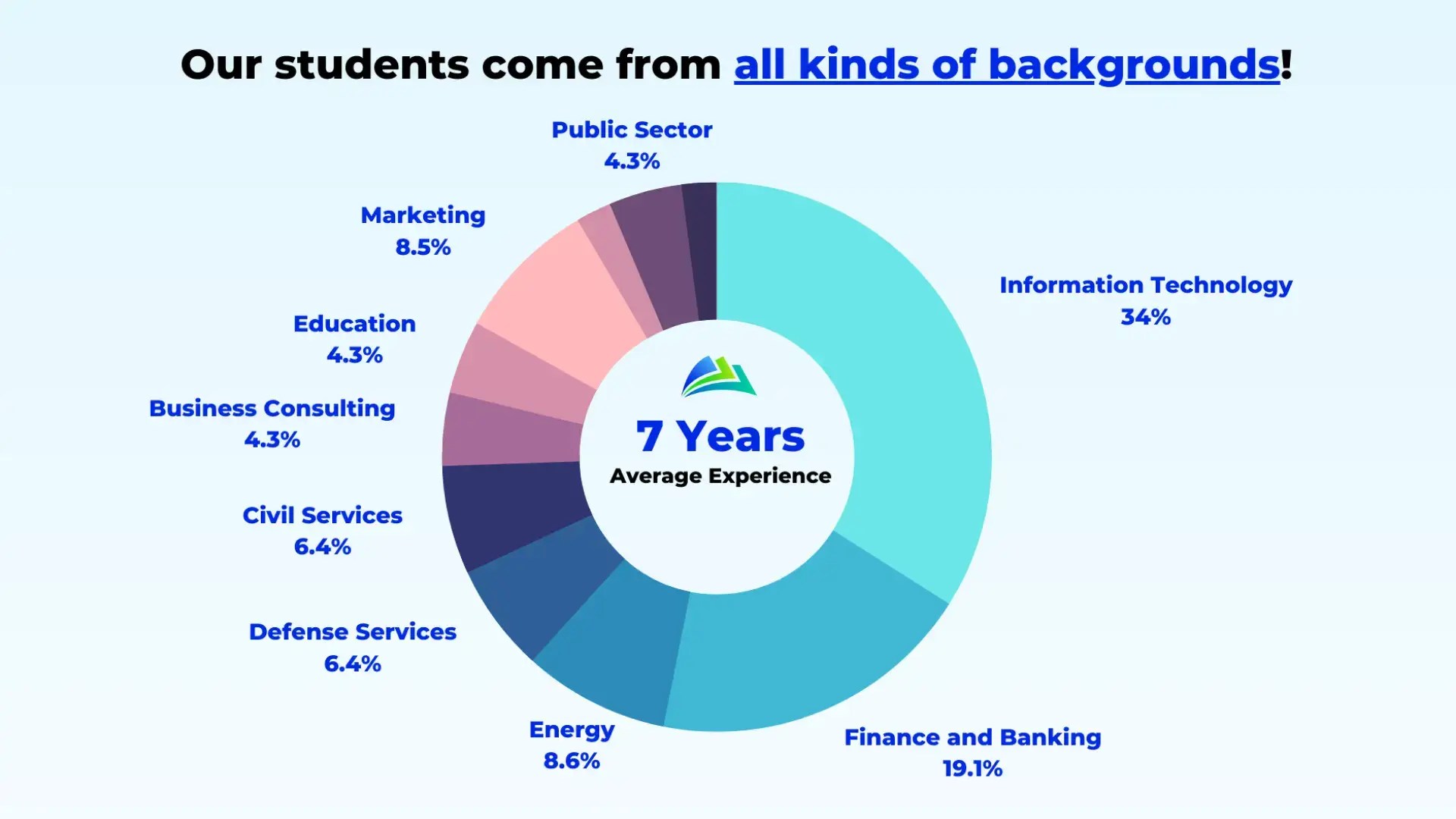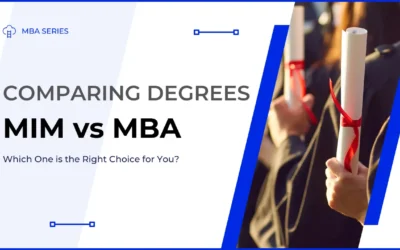Are you thinking about pursuing an MBA?
Guess what? You’re not the only one!
THOUSANDS of students apply to business schools every year. With so much competition, how can you stand out? What do business schools look for in MBA aspirants?
We’ve got the answers.
In this blog post, we’ll explore the key traits that top business schools seek in their MBA applicants. Let’s explore how you can use the next three to six months to improve your profile and create a winning application.
B-schools, here we come!
So, what do B-schools look for in a candidate after all?
Understand this…
B-schools have a particular evaluation criterion through which they are going to look at your candidacy.
Think of it this way: You are an Indian Idol candidate, and the judges have a rubric that they will use to judge you.
5 Factors B-Schools use to evaluate a candidate
There are five factors that these schools will use to judge if you are someone who can thrive in a fairly ambiguous corporate world in the future. They will use these factors to evaluate your profile and compare you with everyone else who’s going to be applying to this school this year.
Let’s explore these 5 factors in detail and build the kind of winning profile that B-schools are looking for!
As we look at each tip, ask yourself two questions:
- “On a scale from 1 to 10, how do I rank?”
- “How can I improve my score?”
Ready for some introspection? In this blog we will cover…
Grab your free copy of ‘Top 50 Profiles Who Cracked MBA with Crackverbal’
Grab your free copy of ‘Top 50 Profiles Who Cracked MBA with Crackverbal’
Factor #1: Goal clarity
The first and most important factor is goal clarity. Most people have a broad idea of what their goal is, but the specifics are not so clear in their heads.
Let’s make this simple for you.
Ask yourself five questions.
1. Where am I headed?
Do you know what you want to do with your career? What are your short-term and long-term goals? Where do you see yourself in the future, let’s say, in 2030?
2. Is this goal truly and uniquely mine?
Is this goal connected to something you are truly passionate about? Is this a goal that is personal to you? What is your motivation behind this goal?
3. Has my life actually prepared me for such a goal?
Have your experiences and your education prepared you to achieve such a goal? What other strengths do you need to achieve your goal?
4. Why do I need an MBA to get to my goal?
Do you truly need an MBA to achieve your goal? Is there any other way to reach your goal? If an MBA is the best path for you, is there a particular B-school you are looking at? How will that particular B-school help you get to your goal?
5. Why is this year the best year for you to get into a B-school?
Why now? Why not last year? Why not next year? Are there any specific factors that have encouraged you to take this step at this stage?
Wherever you are in the application process, make sure that you take the time to ask yourself these five questions. Admission committees judge you based on how logical your goals are and whether there is a path to fulfilling them via an MBA. Once you are convinced about your goal, you will be able to convince any admission committee, any interview panel, or any application reader.
In case you feel that you can’t get this kind of clarity by yourself, Crackverbal offers an exclusive profile evaluation service, through which we will have a one-on-one session with you and help you answer some of these very questions. Reach out to us!
Factor #2: Academic performance
B-schools need to know that you have what it takes to handle the academic rigor of an MBA. Once you start your MBA, you will need to work with very diverse teams that have students from different geographies and functions. You’ll need to put in a great deal of research and pre-work so that you can intelligently discuss your point of view in class.
Simply put, B-schools don’t want students who will end up struggling for the next one or two years. Let’s be honest. You don’t want to end up struggling for the next one or two years either! Imagine finally getting into your dream B-school just to realize that MBA is not your cup of tea!
So then, how do these B-schools judge your academic aptitude? They will check your graduate and undergraduate performance. They’ll want to know where you graduated from and what your mark sheets say about you.
Agreed…the person that you were in college is not the person that you are today. So, is there anything that will help you compensate and show that you have come a long way since your college days?
Yes – a killer GMAT score!
| Rank | School | GMAT Range | Average GMAT |
|---|---|---|---|
| 1 | University of Pennsylvania Wharton | 530-790 | 733 |
| 2 | Columbia Business School | 540-780 | 729 |
| 3 | Harvard Business School | 590-790 | 730* |
| 4 | INSEAD | - | 708 |
| 5 | Northwestern University: Kellogg | 630-780 | 727 |
| 6 | Stanford Graduate School of Business | 610-790 | 738 |
| 7 | University of Chicago: Booth | 590-790 | 732 |
| 8 | London Business School | 590-790 | 708 |
| 9 | Yale School of Management | 690-760 (80%) | 730* |
| 10 | IESE Business School | 580-750 | 670 |
B-schools are looking for candidates who can prove their mettle. Make sure, especially if your academic profile is not the best, to get a GMAT score that is at least 20 to 30 points higher than the global average GMAT score at the school that you’re applying to.
Grab your free copy of ‘Top 50 Profiles Who Cracked MBA with Crackverbal’
Grab your free copy of ‘Top 50 Profiles Who Cracked MBA with Crackverbal’
Factor #3: Highlight your work experience
Do you have a patent in your name?
Is there any specific research work you have done?
No? No problem…
Fortunately, B-schools are just as fond of candidates who bring a lot of technical or deep sectoral expertise because this kind of know-how is also seen as a kind of academic pursuit. Any kind of certification you have to your credit or any educational program you have enrolled in could also add value.
Talking of experience, the one question that we keep getting asked is about the minimum or maximum experience that B-schools expect and if any particular kind of experience is preferred.
Here, at Crackverbal, we have worked with students from varied backgrounds, and experience tells us that there is no specific number of years that are expected as such.
On the one hand, there are candidates who have gotten into Harvard with no experience, and on the other hand, there are candidates who have gotten into Wharton with 10 to 12 years of experience. So instead of looking at it as a quantitative metric, it is important for you to look at it in terms of a qualitative metric.
If you are someone with, let’s say, just one or two years of experience. What have you done in these two years? What experiences have you gathered in your current role? Do you feel that an MBA makes sense for you at this stage? If that is the case, then an MBA is right for you even now.
Or maybe you have spent 10 years in a particular field and have fairly deep knowledge about a particular topic. Maybe you have realized that you need leadership, decision-making, and team management skills to go up the ladder and that an MBA will help you gain exactly that.
One more question that applicants ask is if it’s better to have experience working for a bigger brand or if it’s okay to have experience working for a smaller brand.
If you are one of 10,000 people working in a large company, it could be hard for you to differentiate what you did from what someone else who worked on another project in the same company or in a similar company did.
However, working for a large company does provide you with certain brand credentials. For example, even if you worked at IBM in Timbuktu, the B-schools would understand that you know what global best practices are and that you know how to deal with clients in a professional manner.
Now let’s look at what happens when you work for a smaller company. On the flip side, the company may be less known, and it may be hard for you to really show scale. But you may have to take on more responsibilities, wear multiple hats, interact with the top brass, and, consequently, have more visibility and opportunity to grow.
Get the drift? No matter what the scenario, you need to be telling stories that will help you showcase the unique perspective you bring to the table. It’s not really about where you worked, but what you did.
Tip #4: Identify your “X-Factor”
What’s the X-Factor? Simply put, it is something extra that you have that makes you different from another person who is similar to you in every other way.
Imagine there’s another person who has the same clarity about their goals as you do. This person also has similar academic potential and work experience as you do. But you are different because you have something different.
Now, what are the things that could make you different? The first thing could be leadership skills. Maybe you exhibited these skills at work. Maybe you took on something that was not really part of your job.
Maybe an incident outside of work helped bring out your leadership skills. One of the candidates that we worked with organized a Ganesh pandal in his neighborhood. The entire experience taught him more about management than he could have ever learned from any book.
The second factor is the diversity quotient. Diversity can present itself in various forms. For example, female candidates, all else being equal, would have an advantage over male candidates because B-schools realize that women are underrepresented in B-schools.
Similarly, we have had candidates from the LGBTQ community who have spoken about the challenges they have faced that have changed their perspective on things. We have had people from an army background who brought out the point that constantly shifting to new cities made them so adaptable that they could walk into any situation and still know how to make friends.
What are the things that make you unique? What incidents in your life have given you the X factor? If you are looking at doing an MBA, you have a few months to build your profile. Is it possible for you to suddenly discover an X factor? Probably not…
What can you do?
Think back…what are the things that really interest you in life? What was the one thing that was an integral part of your story that you were truly passionate about?
We had a candidate who was an avid chess player who stopped playing chess once he took up a corporate job. While creating his profile with the Crackverbal admission mentors, he said that chess was a passion he had and that it always gave him something to look forward to.
This realization helped him get back to his passion. He started teaching chess to schoolchildren online. The best part of the story is that he did not go back to chess because of a B-school. He did that because he was truly passionate about teaching and playing chess. Incidents like this would also help build your profile. Just make sure your story is about something you love. Don’t create a story just for the sake of a B-school.
A common myth going around is that candidates need to have “NGO experience” to get into a reputed B-school. If you have been involved with an NGO, please go ahead and include that in your application. But if you don’t have NGO experience, please don’t try to create a false narrative – the adcom will see right through you in the interview. All in all, make sure that you don’t do anything just to impress a B-school admissions committee.
Grab your free copy of ‘Top 50 Profiles Who Cracked MBA with Crackverbal’
Grab your free copy of ‘Top 50 Profiles Who Cracked MBA with Crackverbal’
Tip #5: Let your personality shine through!
No “tip” here as such. All you need to fall back on is your personality.
There is only so much that the adcoms can get to know from your CV, essays, and other aspects of your application. B-schools want to know what you are all about. There are several ways in which they do this. Some schools ask you to submit video essays. Some schools have a group discussion kind of format. All of this is to see whether you have what it takes to do well in a B-school.
But can a person really “improve” his or her personality?
Sure, you can!
You have the next few months. In these few months, you need to work on articulating what you are all about so that you can convince the B-school of your worth.
Start with someone in your family, your colleagues, or your friends. Explain to them why you have decided to do an MBA. Use the other four factors to elaborate on the fact that you have what it takes to be a winning candidate.
Once you have understood how to tell your story, what points to highlight, and how to put across your uniqueness, nothing can stop you!
Conclusion
All set for some introspection and storytelling?
Ask yourself…which are the factors in which you are already doing very well? Which are the factors on which you need to put in some more work? If you’re not sure, a detailed one-on-one conversation with our seasoned mentors will help you analyze the areas that need more work. Get in touch!
Are there any other factors you feel play a role in the adcoms decision? Are you having trouble working out your story with regard to any one of these factors?
Get our E-Book featuring the top 50 unique MBA success stories by downloading it now.









0 Comments